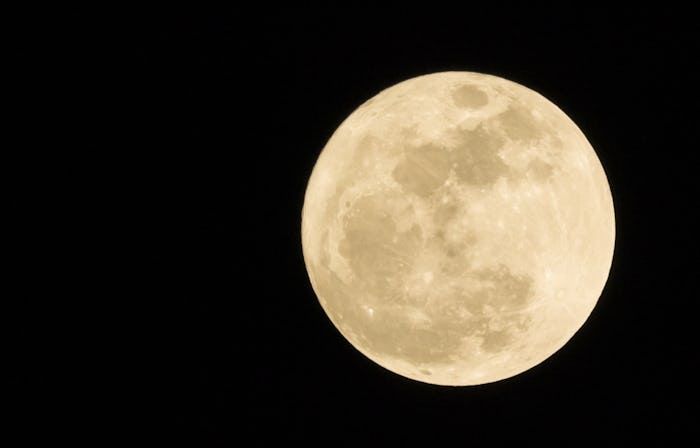Life

How The Supermoon Affects Your Brain, So You Can Plan Accordingly
Holy cow, there are two supermoons in one month in January 2018, and I am here for it. Not because I particularly believe in the power of the supermoon, but because I think it's a genuinely cool phenomena, and for it to happen on both the first and last days of the month is pretty out of this world, if you ask me. However, since the beginning of recorded history, people have blamed the moon on any number of strange things, especially mental mishaps. It's now why we wonder how the supermoon affects your brain, because history tells us to do so.
There isn't any concrete evidence that the supermoon will impact your thinking or cognitive reasoning, noted Psychological Reports. However, it may affect the way you perceive your mind is working at any given point in its cycle. It's the placebo effect. Because you've probably heard since you were quite young that strange things occur during the full moon, you're more likely to attribute irregular happenings to being the fault of the moon as opposed to coincidence. Paraphrasing Heraclitus, "The only thing constant is change." There is almost as much unusual happening in life than what we consider everyday, but when it happens during a full moon or supermoon, we're going to blame the moon, every time.
Did you know that the terms "lunatic" and "lunacy" are derived from the latin word for moon? Apparently, the influence of the moon was thought to be so great in early modern times that they decided to name an entire field of mental illness on the moon, according to the American Psychological Association. Why did they think this? It's unclear, but there's a hypothesis I've heard floating around that a full moon simply makes things easier to see — quite literally.
The idea of being "moonstruck" is of such interest to writers and mythmakers that even since Marie de France in the middle ages, we have, as a civilization, been lulled into the idea of this changeable nature to ourselves which appears to happens on a continuous pattern. We've been fascinated by its possibilities. Here, in this time of the greatest natural illumination of what happens in the night, of course, humans will be preoccupied by its grandeur and mystical quality.
During the 1970s and 1980s, there was a keen interest in scholarship in this area. Why that is we can only guess at, or possibly infer from the literature, but there was a resurgence of popularity in the studies. What that can tell us about how the supermoon affects your brain is that just by its very existence will it draw inquiry. Over and over again.
What is a supermoon? According to NASA, it's actually pretty special.
"A supermoon is a Moon that is full when it is also at or near its closest point in its orbit around Earth. Since the Moon’s orbit is elliptical, one side (apogee) is about 30,000 miles (50,000 km) farther from Earth than the other (perigee). Nearby perigee full Moons appear about 14% bigger and 30% brighter than full Moons that occur near apogee in the Moon's orbit."
When it comes down to it, the moon isn't some obscenely powerful celestial manipulator of behavior. It's fun to blame an errant test score, hangover, or presidential tweet on the supermoon, but in the end, we just didn't study, we drank too much, or we probably check Twitter far more than what is normal.
It's a fun time to get out there and look at the moon with your kids though, and in January, you can do it twice in the same month. That's pretty cool nd may give your brain a boost of energy and inspiration.
Check out Romper's new video series, Romper's Doula Diaries:
Watch full episodes of Romper's Doula Diaries on Facebook Watch.